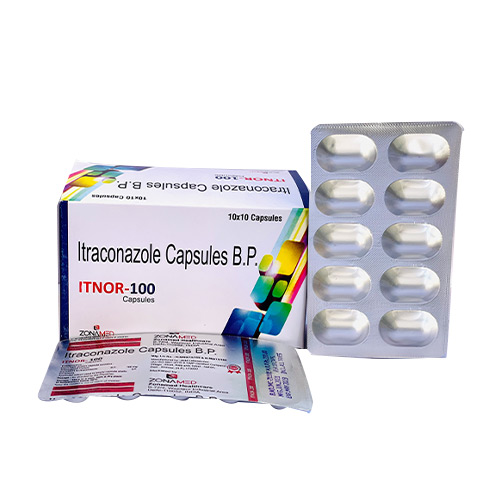ITNOR-100
ITNOR-100 (Itraconazole 100 mg) is an antifungal medication primarily used to treat various fungal infections. It belongs to a class of drugs called triazole antifungals, which work by inhibiting the growth of fungi.
Uses of ITNOR-100 (Itraconazole 100 mg):
- Fungal Infections of the Skin: Effective against infections such as tinea corporis (ringworm), tinea pedis (athlete’s foot), and tinea cruris (jock itch).
- Fungal Infections of the Nails: Used to treat onychomycosis (fungal infection of the toenails or fingernails).
- Systemic Fungal Infections: Used for more severe infections like histoplasmosis, blastomycosis, and aspergillosis, which affect internal organs.
- Yeast Infections: Helps in treating vaginal yeast infections and oral thrush (candidiasis).
- Prophylaxis: Sometimes prescribed for people with weakened immune systems to prevent fungal infections (e.g., in HIV/AIDS or cancer patients undergoing chemotherapy).
Common Side Effects:
- Gastrointestinal Issues:
- Nausea
- Vomiting
- Diarrhea
- Abdominal pain
- Headache: Mild to moderate headaches may occur.
- Dizziness: Some patients may experience dizziness, which could affect the ability to operate machinery or drive.
- Fatigue: Feeling tired or lethargic is a reported side effect.
- Rash: Allergic reactions may cause skin rashes in some individuals.
Serious Side Effects (Less Common):
- Liver Toxicity: Itraconazole can cause liver damage in some people. Symptoms may include yellowing of the skin or eyes (jaundice), dark urine, or severe fatigue.
- Heart Problems: Rarely, Itraconazole may cause heart failure or worsen existing heart conditions, especially in patients with a history of heart disease.
- Hearing Loss: Some cases of reversible and irreversible hearing loss have been reported.
- Severe Allergic Reactions: Symptoms may include swelling of the face, tongue, throat, severe dizziness, or difficulty breathing.
- Neuropathy: Numbness or tingling in hands or feet (peripheral neuropathy).
Precautions:
- Pregnancy and Breastfeeding: It is usually not recommended during pregnancy unless necessary, and should be avoided while breastfeeding.
- Drug Interactions: Itraconazole interacts with many other drugs, including certain heart medications, antacids, and blood thinners. Consult with a doctor about all medications being taken.
Always consult with a healthcare professional before starting Itraconazole to ensure it’s appropriate for your condition and to monitor for any potential side effects.






Reviews
There are no reviews yet.